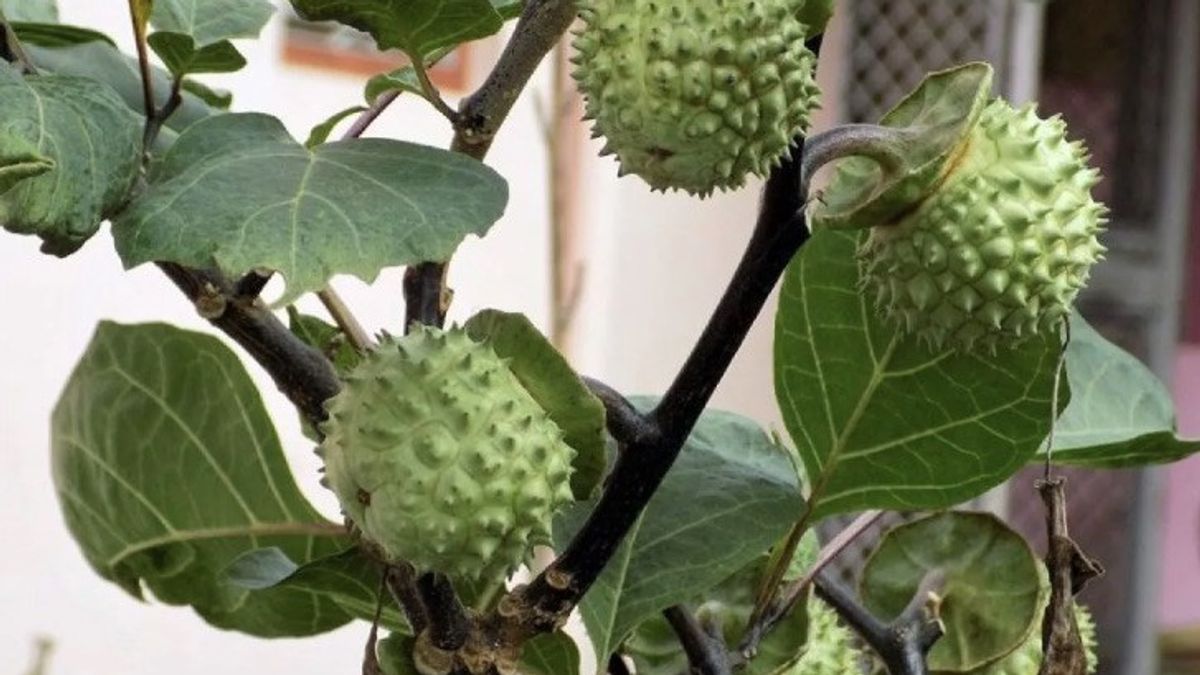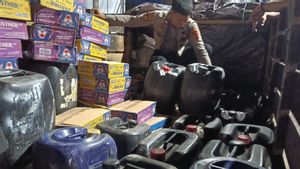JAKARTA Tanaman kecubun is being discussed lately, because it is considered to be the cause of dozens of people in Banjarmasin, South Kalimantan have been drunk until they are treated at a Mental Hospital. It takes education to the public that a dangerous tube plant is consumed.
Recently, a video on social media has gone viral, which says many people are drunk as a result of consuming kecubung fruit. The Sambang Lihum Mental Hospital in Banjar Regency reportedly treated up to 47 patients who were suspected of having been drunk because the effect was similar to after eating this green fruit.
Two of them even died after reportedly mixing with alcohol and drugs.
However, after an interview with a conscious patient, RSJ Sambang Lihum's Consultative Addictary, Banjarmasin, Firdaus Yamani, said that it was not the result of a warehousing that caused the death of two people in Banjarmasin, but white pills without a brand.
"Initially, it was thought to have consumed the opaque fruit because the effect it had was similar to the opaque fruit," said Firdaus in Media Briefing organized by the Executive Board of the Indonesian Doctors Association (PB IDI), Friday (19/7/2024).
Kecubung has the Latin name Catatra fastuos is a plant from the Solanaceae family. The characteristics of kecubung include a large flower stretching and bermahkota resembling a trumpet of length approximately 12-18 cm white, yellow, cream, orange, or red. The shape of the unique kecubung fruit, round, green, medium-sized thorn is as big as a tennis ball and it contains small brownish yellow seeds.
This plant grows wild anywhere, in the open with full sunlight, deserts, open shrubs, on the river bank, from lowland to 800 meters above sea level.
The tube has actually been used for traditional medicine in various countries, especially as pesticides.
"Some use it for treatment of asthma, cough, vomiting, pain, anesthetic, and others," said Firdaus.
However, people are often misused by the warehousing. Consuming opaque in origin and excessive can provide effects of getting drunk and hallucinations.
Firdaus said that kecubung has a hallusionnogenic effect that causes hallucinations. This is because kecubung contains tropical alkaloid compounds, such as atropines, skopolamins, and hyposiamins.
"This alkaloid compound is present in all parts of the opaque plant, but the highest levels are in the flower and leaf parts," said Firdaus explained.
Due to hallucinatory effects and abuse, the use of warehousing as a treatment has become limited. The Food and Drug Supervisory Agency (BPOM) has banned the use of warehousing as a traditional drug due to the misuse of this plant and the presence of hallucinatory effects.
According to Firdaus, cases of convex poisoning have existed for a long time, but previously there were only one or two cases, unlike what is happening today.
The National Narcotics Agency (BNN) conducted a survey in 2006 regarding the misuse of the use and circulation of illegal drugs in student groups in 18 provinces in Indonesia, it was found that East Nusa Tenggara (NTT) Province was the highest province in cases of fraud.
The case of convex poisoning also occurred in the United States. The American Association of Poison Control Centers reported that in 1993 there were 318 cases of convex poisoning. In 2014, cases of anti-colinergaric plant poisoning were reported at 610 cases.
Regarding the case of the death of two people in Banjarmasin who were said to have been drunk, Firdaus gave an explanation. According to him, the two patients died not because of a kecubung plant, but a white pill without a brand that was suspected of having a tube-like effect.
This conclusion was obtained after conducting interviews with other conscious patients.
"Other facts that we get from other conscious patients who can already be talked to most of them say they don't eat convex fruit directly, it turns out that they consume white pills without a brand," said Firdaus.
He added that the white pill was obtained from drug sellers who were subscribed to them to get the Carnophen or Zenith pill to get drunk. Firdaus explained that these two pills are drugs containing PCC, namely Paracetamol, Caffeine, and Carisoprodol. These pills are actually drugs to relieve bone pain, but are abused as stimulants, drugs with sedative effects.
"Because the effect is the same as eating a warehousing fruit, so people think they consume warehousing fruit," explained this member of the Indonesian Mental Health Specialist Association (PDSKJI).
Currently, the content of the white pill without a brand and the label is being investigated by BNN and the police.
"Because the effect is similar to a warehousing fruit, there is a possibility that this white pill contains warehousing extract. However, the certainty is waiting for the results of the research by BNN and the police," he said.
Although he is recognized as having a number of benefits, Firdaus emphasized that further research is needed whether it is really useful or not because scientific evidence is weak.
Kecubung plant, explained Firdaus can cause damage to the brain if consumed many times. In addition, in more severe cases, you can experience mental disorders, hallucinations, concnitive functions are also chaotic.
SEE ALSO:
"If consumed excessively can even cause death, there is respiratory depression or respiratory muscle paralysis," he said.
Even though this has not been included by the government as a narcotics, because the effect can cause death to be avoided. This is very dangerous. Education is needed for the public to stay away from consuming this fruit," said Firdaus ending.
The English, Chinese, Japanese, Arabic, and French versions are automatically generated by the AI. So there may still be inaccuracies in translating, please always see Indonesian as our main language. (system supported by DigitalSiber.id)













